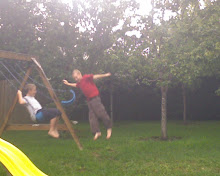I know I'm very behind on my blogs. Sorry about that. I guess things got busy. I'll fill you in soon. In the mean time, I'd like to tell you that two days ago was the 2 year anniversary of when I was diagnosed with Asperger's Syndrome. For those of you still figuring out what that means, I found a great list of descriptions from the wiki:
http://en.wikipedia.org/wiki/Asperger_syndrome
This list is all very true and real in my life. Especially times like this past week, in which a lot of social interaction was required, and my acting ability (my learned skills of acting and talking like a normal person in order to be understood by others) just went the way of the dodo. This is explained by number 17 below.
Fortunately, most of yesterday's chores and errands involved only breif conversations, so I've been able to restore my ability to act and interpret, and should be a lot more social again by tomorrow. This makes me happy. I like to be social. I feel trapped and sad when I know I can't do it just right and I might not convey the correct responses when a friend is talking to me. I don't want to hurt their feelings or make them think that I don't care. But if I don't try really hard, that's what will happen.
The following is from the wiki site listed above:
In Asperger's Syndrome, Intervening in Schools, Clinics, and Communities, Tony Attwood categorizes the many ways that lack of "theory of mind" can negatively impact the social interactions of people with Aspergers:
1. Difficulty reading the social and emotional messages in the eyes - People with AS don't look at eyes often, and when they do, they can't read them.
2. Making literal interpretation - AS individuals have trouble interpretting colloquialisms, sarcasm, and metaphors.
3. Being considered disrespectful and rude - Prone to egocentric behavior, individuals with Aspergers miss cues and warning signs that this behavior is inappropriate.
4. Honesty and deception - Children with Aspergers are often considered "too honest" and have difficulty being deceptive, even at the expense of hurting someone's feelings.
5. Becoming aware of making social errors - As children with Aspergers mature, and become aware of their mindblindness, their fear of making a social mistake, and their self-criticism when they do so, can lead to social phobia.
6. A sense of paranoia - Because of their mindblindness, persons with Aspergers have trouble distinguishing the difference between the deliberate or accidental actions of others, which can in turn lead to a feeling of paranoia.
7. Managing conflict - Being unable to understand other points of view can lead to inflexibility and an inability to negotiate conflict resolution. Once the conflict is resolved, remorse may not be evident.
8. Awareness of hurting the feelings of others - A lack of empathy often leads to unintentionally offensive or insensitive behaviors.
9. Repairing someone's feelings - Lacking intuition about the feelings of others, people with AS have little understanding of how to console someone or how to make them feel better.
10. Recognizing signs of boredom - Inability to understand other people's interests can lead AS persons to be inattentive to others. Conversely, people with AS often fail to notice when others are uninterested.
11. Introspection and self-consciousness - Individuals with AS have difficulty understanding their own feelings or their impact on the feelings of other people.
12. Clothing and personal hygiene - People with AS are unaffected by peer pressure. As a result, they often do what is comfortable and are unconcerned about their impact on others.
13. Reciprocal love and grief - Since people with AS react more practically than emotionally, their expressions of affection and grief are often short and weak.
14. Understanding of embarrassment and faux pas - Although persons with AS have an intellectual understanding of embarrassment and faux pas, they are unable to grasp concepts on an emotional level.
15. Coping with criticism - People with AS are compelled to correct mistakes, even when they are made by someone in a position of authority, such as a teacher. For this reason, they can be unwittingly offensive.
16. Speed and quality of social processing - Because they respond through reasoning and not intuition, AS individuals tend to process social information more slowly than the norm, leading to uncomfortable pauses or delays in response.
17. Exhaustion - As people with AS begin to understand theory of mind, they must make a deliberate effort to process social information. This often leads to mental exhaustion.
Alaska to California: The last chapter
6 years ago




No comments:
Post a Comment